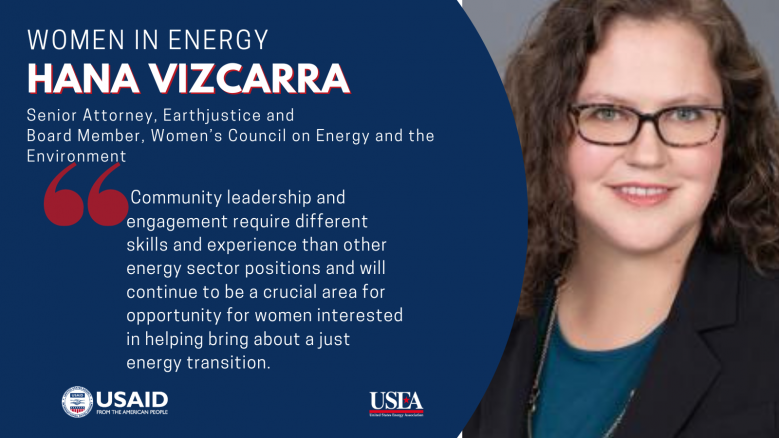
Women in Energy: Hana Vizcarra
The Women in Energy series is a joint project between USEA and USAID to help improve the visibility of women's participation and leadership in the traditionally male-dominated energy sector and their active participation in policies and gender outcomes in organizations.

Every month we feature a woman who has shown exemplary leadership. The women highlighted come from diverse backgrounds and roles, and they bring with them a unique perspective on gender equality within the energy sector. We believe that increasing women's leadership and participation in decision-making for climate policies needs active communications campaigns and championing that catalyze behavioral change and urgent action.
1. Do you feel that your education and career path led you to where you are today? Were there mentors and cheerleaders along the way?
I made some important career and education shifts along my professional journey so far, the combination of which made me right for my current position. Missing any one of them likely would have taken me in very different directions. Seeking and taking a position off your current career path is scary but can also be incredibly rewarding. I’ve had a few distinct moments like that in my career – deciding to go to law school while working in politics, the law firm and practice group opportunities I took, and then leaving law firms for an entirely different type of legal career. The impacts of those specific decisions were not always felt right away, but, looking back, I can see that I likely would not be where I am today without each of them.
I also found mentors along the way, although I didn’t have strong mentors or sponsors in every role. I encourage people to think broadly about what “mentor” means to you. You can learn a lot from your peers and from people who may not consider themselves your mentor at the time. Ultimately, I found more meaningful mentor relationships further along in my career when I reached positions where I thrived and really enjoyed my work.
2. How does your organization support women’s empowerment and advanced gender equality through its energy-related work?
Earthjustice, the non-profit public interest environmental law organization where I work, takes equality and inclusion very seriously. They incorporate principles into their hiring practices to combat implicit bias, have made significant efforts to train managers and reform management and review practices to do the same, and continuously elicit feedback from employees and seek out ways to improve as an organization. In my two years with Earthjustice, I have been extremely impressed by the seriousness with which equality, justice, and inclusion are incorporated into every level of the organization and are top of mind for how we all approach our work.
I am also a board member of the Women’s Council on Energy & the Environment (WCEE), a professional development organization created to help women succeed in the energy and environmental fields, grow their connections, and to expand their knowledge and skills. It’s a volunteer organization that has been around for over 40 years and reflects the wide interests of its membership. The programming WCEE provides is responsive to what members are interested in, allowing it to evolve over time. One of the great advantages of WCEE over many other professional organizations is that it is not limited to a specific professional career set. WCEE members are lawyers, scientists, public affairs and government affairs specialists, private and public sector workers, and much more – allowing people to grow their network outside of their specific job function and learn about a wider array of opportunities in the energy and environmental fields. I have learned so much from the people I’ve met through WCEE.
3. How is your organization attracting, retaining, and promoting more women into senior management positions to respond to the current industry transformation? Is your organizational data publicly available?
Earthjustice publishes its organizational data on its public website: https://earthjustice.org/about/diversity-equity-inclusion. This includes data specifically about our senior leadership, 50% of whom are women.
4. Embracing what changes in the sector at large do you think will launch more women into leadership positions? What according to you are some of the biggest opportunities for women leaders in the sector today?
There is a lot of change happening in the energy sector right now, bringing with it new opportunities. The transition to clean energy is shaking up traditional career paths and networks. This is reflected in the diversity of clean energy organizations and companies as compared to the traditional fossil fuel industry. For example, many of the clean energy trade associations in the United States are currently led by women. And many women are interested in working in the exciting new industries that will help make this transition happen. They are building the expertise to be extremely competitive for leadership roles as the clean energy industry matures.
There is also an increased emphasis on environmental justice in the energy sector. Communities are demanding more responsible actions from companies and the government so that the communities that have been most negatively affected by energy development are prioritized for the benefits of the new clean energy industry and do not bear the brunt of the industrial development yet again. Women are often leaders in their communities, making them well-positioned to lead efforts to protect their communities. Community leadership and engagement require different skills and experience than other energy sector positions and will continue to be a crucial area of opportunity for women interested in helping bring about a just energy transition.
5. What would be your one practical recommendation to mentor or support women starting a career in energy or climate action?
Be flexible, look at the skills that you gain from different opportunities and the substantive knowledge as separate building blocks you need to acquire. You may not get both in each opportunity but be aware of how they can build towards the career you want.
